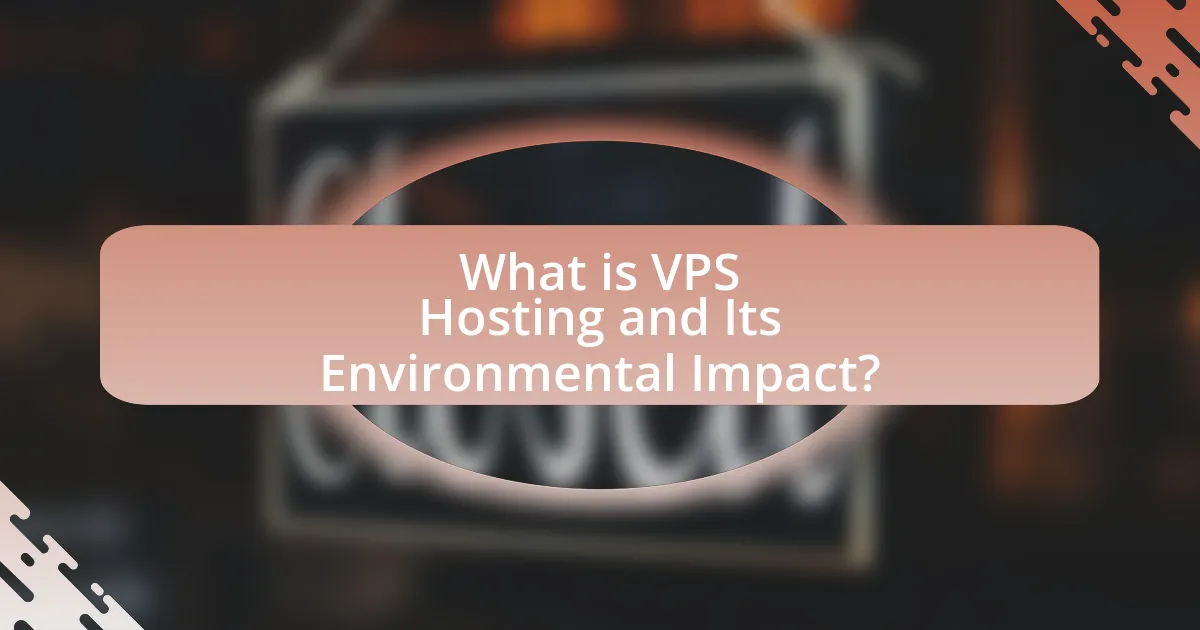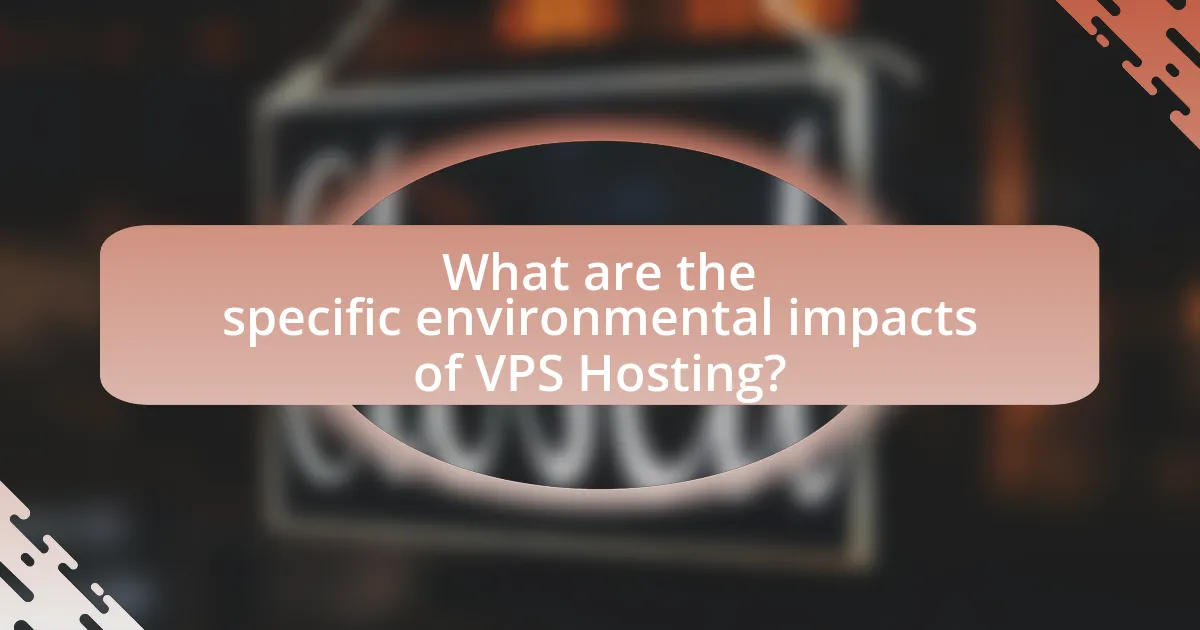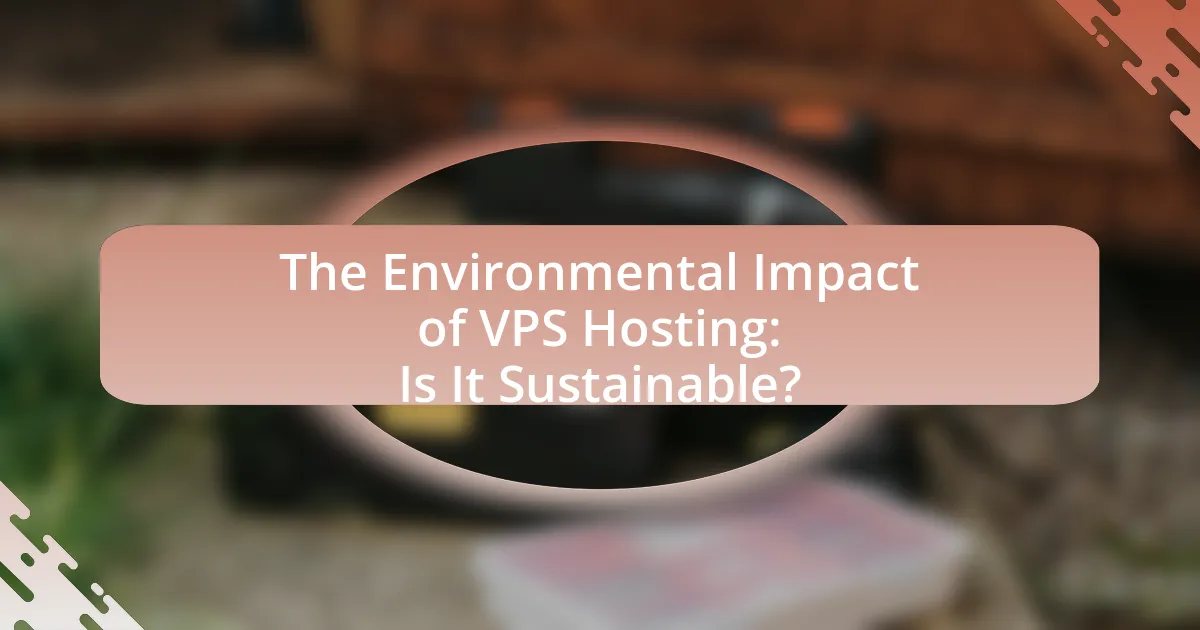VPS hosting, or Virtual Private Server hosting, is a web hosting solution that utilizes virtualization technology to allocate dedicated resources on a shared server, offering a balance between performance and cost-effectiveness. This article examines the environmental impact of VPS hosting, highlighting its advantages over traditional dedicated servers in terms of energy efficiency and reduced carbon emissions. Key features of VPS hosting, such as scalability, enhanced security, and root access, are discussed, along with the importance of sustainability in data center operations. The article also explores best practices for minimizing environmental impact, including the use of renewable energy sources and energy-efficient hardware, providing insights for users seeking eco-friendly hosting solutions.

What is VPS Hosting and Its Environmental Impact?
VPS hosting, or Virtual Private Server hosting, is a type of web hosting that uses virtualization technology to provide dedicated resources on a shared server. This hosting solution allows multiple users to operate their own virtual servers while sharing the physical hardware, which can lead to more efficient resource utilization compared to traditional dedicated hosting.
The environmental impact of VPS hosting is generally lower than that of dedicated servers due to shared resources, which can reduce energy consumption and carbon emissions. For instance, a study by the Global e-Sustainability Initiative (GeSI) indicates that virtualization can lead to energy savings of up to 80% in data centers. Additionally, many VPS providers are increasingly adopting green technologies, such as renewable energy sources and energy-efficient hardware, further mitigating their environmental footprint.
How does VPS Hosting differ from other hosting types?
VPS hosting differs from other hosting types by providing dedicated resources within a shared environment, allowing for greater control and customization. Unlike shared hosting, where multiple users share the same server resources, VPS hosting allocates specific portions of CPU, RAM, and storage to each virtual server, ensuring consistent performance. In contrast to dedicated hosting, which involves an entire physical server for a single user, VPS hosting offers a more cost-effective solution while still delivering enhanced performance and flexibility. This distinction is crucial for users needing reliable performance without the expense of dedicated servers, making VPS hosting a popular choice for businesses and developers.
What are the key features of VPS Hosting?
VPS Hosting offers several key features, including dedicated resources, scalability, enhanced security, and root access. Dedicated resources ensure that each virtual private server has its own allocated CPU, RAM, and storage, which improves performance and reliability compared to shared hosting. Scalability allows users to easily upgrade or downgrade their resources based on their needs, making it suitable for growing businesses. Enhanced security features, such as isolated environments and customizable firewalls, protect against potential threats. Root access provides users with full control over their server, enabling them to install software and configure settings as needed. These features collectively make VPS Hosting a flexible and powerful option for various hosting needs.
How does resource allocation in VPS Hosting affect the environment?
Resource allocation in VPS hosting affects the environment primarily through energy consumption and resource efficiency. VPS hosting utilizes virtualized servers, which can lead to better resource utilization compared to traditional dedicated servers, thereby reducing the overall energy footprint. For instance, a study by the Global e-Sustainability Initiative found that optimizing server utilization can decrease energy consumption by up to 80%. This efficiency not only lowers carbon emissions but also minimizes electronic waste, as fewer physical servers are needed to handle the same workload. Therefore, effective resource allocation in VPS hosting contributes to a more sustainable approach to data management and environmental conservation.
Why is sustainability important in the context of VPS Hosting?
Sustainability is important in the context of VPS Hosting because it minimizes environmental impact while optimizing resource efficiency. VPS Hosting typically involves shared physical servers, which can lead to significant energy consumption and carbon emissions. By implementing sustainable practices, such as using renewable energy sources and improving server efficiency, data centers can reduce their carbon footprint. For instance, a study by the International Energy Agency reported that data centers accounted for about 1% of global electricity demand in 2020, highlighting the need for sustainable solutions to mitigate energy use and environmental degradation.
What are the environmental challenges associated with data centers?
Data centers face significant environmental challenges, primarily due to their high energy consumption and carbon emissions. These facilities require substantial electricity to power servers and maintain optimal cooling, contributing to increased greenhouse gas emissions. For instance, a report by the International Energy Agency (IEA) indicated that data centers consumed about 200 terawatt-hours (TWh) of electricity in 2018, accounting for roughly 1% of global electricity demand. Additionally, the cooling systems used to prevent overheating contribute to water usage and can lead to thermal pollution in local ecosystems. Furthermore, the disposal of electronic waste from outdated hardware poses a challenge, as improper disposal can lead to soil and water contamination. These factors collectively highlight the environmental impact of data centers, necessitating sustainable practices to mitigate their ecological footprint.
How does energy consumption in VPS Hosting contribute to carbon emissions?
Energy consumption in VPS hosting contributes to carbon emissions primarily through the electricity used to power servers and data centers. The majority of electricity generated globally comes from fossil fuels, which release carbon dioxide when burned. For instance, according to the International Energy Agency, in 2021, fossil fuels accounted for about 80% of global electricity generation. As VPS hosting relies on these energy sources, the higher the energy consumption, the greater the carbon emissions associated with it. Additionally, the cooling systems required to maintain optimal server temperatures also consume significant energy, further exacerbating the carbon footprint. Therefore, the energy-intensive nature of VPS hosting directly correlates with increased carbon emissions due to reliance on fossil fuel-based electricity.

What are the specific environmental impacts of VPS Hosting?
VPS hosting has specific environmental impacts primarily related to energy consumption and electronic waste. The servers used in VPS hosting require significant electricity to operate and cool, contributing to carbon emissions if sourced from non-renewable energy. For instance, data centers, which host VPS services, are responsible for about 2% of global greenhouse gas emissions, according to the International Energy Agency. Additionally, the lifecycle of hardware used in VPS hosting generates electronic waste, which can be harmful if not disposed of properly. This waste includes servers and components that may contain toxic materials, further impacting the environment.
How does VPS Hosting affect energy consumption?
VPS hosting generally reduces energy consumption compared to traditional dedicated hosting. This is because VPS hosting allows multiple virtual servers to run on a single physical server, optimizing resource usage and minimizing waste. According to a study by the Global e-Sustainability Initiative, virtualization technologies, such as those used in VPS hosting, can lead to energy savings of up to 80% by maximizing server utilization and reducing the number of physical machines required. This efficiency not only lowers energy costs but also decreases the overall carbon footprint associated with data center operations.
What are the energy efficiency metrics for VPS Hosting?
Energy efficiency metrics for VPS Hosting include Power Usage Effectiveness (PUE), which measures the ratio of total building energy usage to the energy used by the IT equipment alone, and Server Utilization Rate, which indicates the percentage of server capacity being actively used. PUE values typically range from 1.1 to 2.0, with lower values indicating better efficiency. Additionally, the Carbon Usage Effectiveness (CUE) metric assesses the carbon emissions produced per unit of IT energy consumed, providing insight into the environmental impact of the hosting service. These metrics are essential for evaluating the sustainability of VPS Hosting solutions.
How can VPS Hosting providers reduce energy usage?
VPS hosting providers can reduce energy usage by implementing energy-efficient hardware and optimizing server utilization. By utilizing energy-efficient processors and solid-state drives, providers can significantly lower power consumption. Additionally, optimizing server workloads through virtualization techniques allows for better resource allocation, reducing the number of physical servers needed. According to a study by the Global e-Sustainability Initiative, data centers can achieve energy savings of up to 30% by adopting these practices.
What role does renewable energy play in VPS Hosting sustainability?
Renewable energy significantly enhances the sustainability of VPS hosting by reducing carbon emissions associated with data center operations. Data centers, which power VPS hosting, are major consumers of electricity, often relying on fossil fuels that contribute to environmental degradation. By transitioning to renewable energy sources like solar, wind, and hydroelectric power, data centers can operate with a much lower carbon footprint. For instance, a study by the International Energy Agency reported that renewable energy could reduce global CO2 emissions from electricity generation by up to 70% by 2050. This shift not only supports environmental sustainability but also aligns with growing consumer demand for eco-friendly hosting solutions.
How can VPS Hosting companies transition to renewable energy sources?
VPS hosting companies can transition to renewable energy sources by investing in solar, wind, or hydroelectric power for their data centers. This shift can be achieved through partnerships with renewable energy providers or by installing on-site renewable energy systems, such as solar panels. For instance, Google has committed to operating its data centers on 100% renewable energy, demonstrating that large tech companies can successfully implement such strategies. Additionally, VPS hosting companies can purchase renewable energy certificates (RECs) to offset their carbon footprint, ensuring that their energy consumption is matched by renewable energy production. This approach not only reduces environmental impact but also aligns with growing consumer demand for sustainable practices in technology.
What are the benefits of using green energy in VPS Hosting?
Using green energy in VPS hosting significantly reduces carbon emissions, contributing to a more sustainable environment. By utilizing renewable energy sources such as solar, wind, or hydroelectric power, VPS hosting providers can minimize their reliance on fossil fuels, which are major contributors to greenhouse gas emissions. For instance, a study by the International Renewable Energy Agency (IRENA) indicates that transitioning to renewable energy can reduce global carbon emissions by up to 70% by 2050. Additionally, green energy often leads to lower operational costs over time, as renewable sources can be more cost-effective than traditional energy sources. This combination of environmental benefits and potential cost savings makes green energy an advantageous choice for VPS hosting.

What are the best practices for sustainable VPS Hosting?
The best practices for sustainable VPS hosting include utilizing energy-efficient hardware, optimizing server utilization, and choosing green data centers. Energy-efficient hardware reduces power consumption, which is crucial as data centers account for approximately 2% of global electricity use. Optimizing server utilization through virtualization techniques can significantly decrease the number of physical servers needed, thereby lowering energy demands. Selecting data centers that use renewable energy sources, such as solar or wind, further enhances sustainability, as these facilities often aim for carbon neutrality. According to the International Energy Agency, transitioning to renewable energy can reduce greenhouse gas emissions by up to 70% in the data center sector.
How can users choose environmentally friendly VPS Hosting providers?
Users can choose environmentally friendly VPS hosting providers by evaluating their use of renewable energy sources, energy-efficient data centers, and sustainable practices. Providers that operate data centers powered by renewable energy, such as solar or wind, significantly reduce their carbon footprint. For instance, companies like GreenGeeks and A2 Hosting are known for their commitment to sustainability, with GreenGeeks claiming to offset three times the energy they consume. Additionally, users should look for certifications like Energy Star or ISO 14001, which indicate adherence to environmental management standards. By prioritizing these factors, users can ensure they select VPS hosting providers that actively contribute to environmental sustainability.
What certifications should users look for in VPS Hosting services?
Users should look for certifications such as ISO 27001, which indicates a commitment to information security management, and ISO 14001, which demonstrates effective environmental management systems in VPS Hosting services. These certifications ensure that the hosting provider adheres to international standards for data protection and environmental sustainability, respectively. Additionally, certifications like Energy Star and Green Data Center certifications can indicate energy efficiency and reduced carbon footprint, reinforcing the provider’s commitment to sustainability.
How can users assess the sustainability practices of VPS Hosting companies?
Users can assess the sustainability practices of VPS Hosting companies by examining their energy sources, data center efficiency, and carbon offset initiatives. Companies that utilize renewable energy sources, such as solar or wind, demonstrate a commitment to reducing their environmental impact. Additionally, evaluating the energy efficiency of their data centers, often measured by Power Usage Effectiveness (PUE), provides insight into their operational sustainability. For instance, a PUE of 1.2 indicates a highly efficient data center. Furthermore, companies that participate in carbon offset programs or have sustainability certifications, such as ISO 14001, show proactive efforts in mitigating their carbon footprint.
What are some practical tips for minimizing the environmental impact of VPS Hosting?
To minimize the environmental impact of VPS hosting, users should choose providers that utilize renewable energy sources for their data centers. Research indicates that data centers consume about 1-2% of global electricity, and transitioning to renewable energy can significantly reduce carbon emissions associated with hosting services. Additionally, optimizing server configurations to reduce resource usage, such as using efficient software and minimizing unnecessary processes, can lower energy consumption. Implementing virtualization techniques allows multiple virtual servers to run on a single physical server, maximizing resource efficiency. Lastly, regularly monitoring and adjusting resource allocation based on actual usage can prevent over-provisioning, further decreasing energy waste.
How can users optimize their VPS configurations for energy efficiency?
Users can optimize their VPS configurations for energy efficiency by selecting lightweight operating systems and applications, which reduce resource consumption. Implementing virtualization technologies, such as containerization, allows multiple applications to run on a single server, maximizing hardware utilization and minimizing energy waste. Additionally, users should regularly monitor and adjust resource allocation based on actual usage, ensuring that they are not over-provisioning resources, which can lead to unnecessary energy consumption. Research indicates that optimizing server configurations can lead to energy savings of up to 30%, demonstrating the effectiveness of these strategies in reducing the environmental impact of VPS hosting.
What strategies can users implement to reduce their carbon footprint while using VPS Hosting?
Users can reduce their carbon footprint while using VPS Hosting by selecting providers that utilize renewable energy sources for their data centers. Many VPS hosting companies are increasingly adopting green energy solutions, such as solar or wind power, which significantly lowers the carbon emissions associated with server operations. Additionally, users can optimize their server configurations to minimize resource usage, such as choosing lightweight applications and efficient coding practices, which can lead to lower energy consumption. Furthermore, users should consider consolidating workloads to fewer servers, thereby reducing the overall energy demand. According to a report by the International Energy Agency, data centers account for about 1% of global electricity demand, highlighting the importance of energy-efficient practices in reducing environmental impact.


